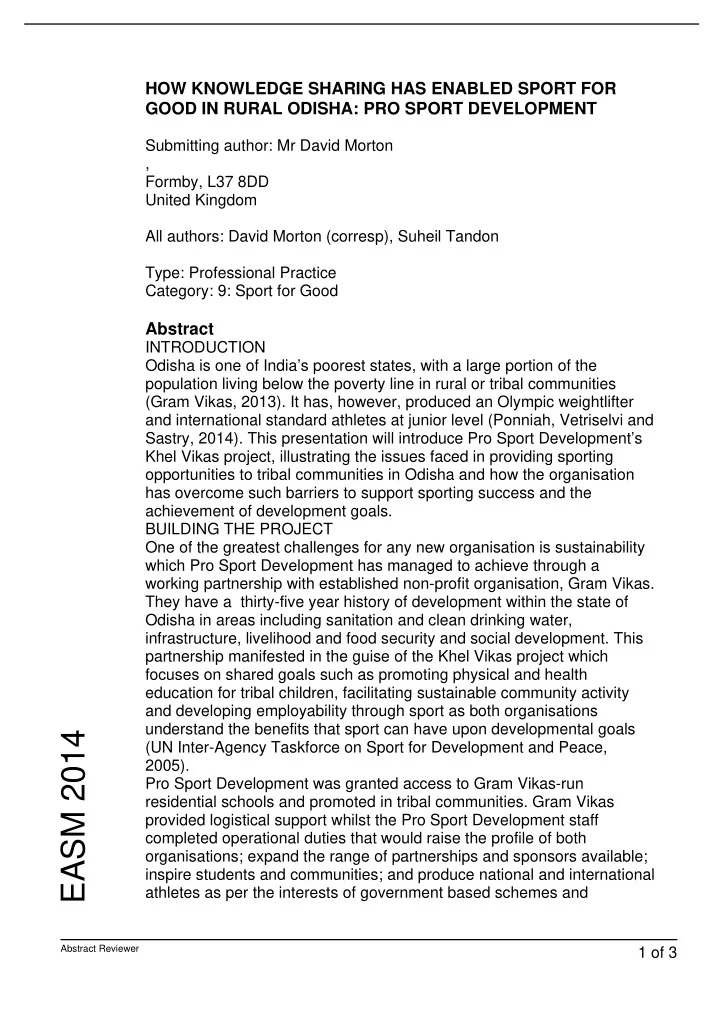

HOW KNOWLEDGE SHARING HAS ENABLED SPORT FOR GOOD IN RURAL ODISHA: PRO SPORT DEVELOPMENT Submitting author: Mr David Morton , Formby, L37 8DD United Kingdom All authors: David Morton (corresp), Suheil Tandon Type: Professional Practice Category: 9: Sport for Good Abstract INTRODUCTION� Odisha is one of India’s poorest states, with a large portion of the population living below the poverty line in rural or tribal communities (Gram Vikas, 2013). It has, however, produced an Olympic weightlifter and international standard athletes at junior level (Ponniah, Vetriselvi and Sastry, 2014). This presentation will introduce Pro Sport Development’s Khel Vikas project, illustrating the issues faced in providing sporting opportunities to tribal communities in Odisha and how the organisation has overcome such barriers to support sporting success and the achievement of development goals.� BUILDING THE PROJECT� One of the greatest challenges for any new organisation is sustainability which Pro Sport Development has managed to achieve through a working partnership with established non-profit organisation, Gram Vikas. They have a thirty-five year history of development within the state of Odisha in areas including sanitation and clean drinking water, infrastructure, livelihood and food security and social development. This partnership manifested in the guise of the Khel Vikas project which focuses on shared goals such as promoting physical and health education for tribal children, facilitating sustainable community activity and developing employability through sport as both organisations understand the benefits that sport can have upon developmental goals EASM 2014 (UN Inter-Agency Taskforce on Sport for Development and Peace, 2005). � Pro Sport Development was granted access to Gram Vikas-run residential schools and promoted in tribal communities. Gram Vikas provided logistical support whilst the Pro Sport Development staff completed operational duties that would raise the profile of both organisations; expand the range of partnerships and sponsors available; inspire students and communities; and produce national and international athletes as per the interests of government based schemes and Abstract Reviewer 1 of 3
programs (http://www.sportsauthorityofindia.nic.in/).� OVERCOMING OPERATIONAL BARRIERS � Khel Vikas has faced resistance due to cultural attitudes towards sport. In schools, it is disregarded due to a perceived lack of academic status, whilst in communities, it is a lower priority due to work and family commitments. The project’s management pressed for sport’s inclusion into school life and constantly look to knowledge sharing as a method of educating participants and staff in its benefits relating to academic success, health, gender equality, employability and managing disability (DASRA, 2013). � Human resources was a critical concern as many local sport and other professionals were averse to working in the development sector in rural areas. To combat this, suitably qualified interns and volunteers have helped to progress the working of the organisation through knowledge transfer in fields such as sport management; pedagogy; coaching and coach education; communications and new media; and sport science. This knowledge has benefitted the organisation and has allowed for development of new permanent members of staff derived from the local community as is recommended in tribal education (Bagai & Nundy, 2009). � Currently, many government prerogatives for support revolve around the success of elite athletes (http://www.sportsauthorityofindia.nic.in/). Therefore Khel Vikas has had to prioritise elite development and use the knowledge and success derived from this area to drive up participation and improve understanding of sport within recreation programs and physical education. This area of knowledge sharing is critical in the acceptance of the Khel Vikas objectives as it is often the young athletes who learn initially and transfer their own learning to other children who aspire to elite performance.� SUCCESS AND LEARNING � Insights gained from knowledge sharing were often voluntary, whether formal or informal, at Pro Sport Development. Some information allowed for immediate fixes to be made to programs. Such information has improved performance in elite programs such as when sport science knowledge was used to progress weightlifting with increased numbers of personal bests achieved and medals won in the past twelve months. Success has made the program more attractive with increased numbers of local and national applicants for long-term and permanent job roles EASM 2014 since publicising achievements.� Other knowledge has enabled the organisation to challenge basic assumptions, of the staff and of the program consumer. Tackling these issues have caused the change in program delivery that has facilitated increased participation numbers throughout both recreational and competitive programs. Qualitatively analysing participation factors instigated the provision of an athletics program that very quickly became the highest participatory activity in the project, maintaining consistent attendance. � With the influx of new staff comes knowledge that will help to further Abstract Reviewer 2 of 3
refine programs but will also allow for project expansion. Knowledge sharing will therefore become cyclical as new systems and issues arise. References Bagai, S. & Nundy, N. (2009). Tribal Education: A fine balance. Mumbai. DASRA Catalyst for Social Change. � DASRA (2013) Power of Play: Sport for Development in India. Mumbai. DASRA Catalyst for Social Change.� Gram Vikas. (2013) Annual Report 2012-2013. Berhampur, Odisha. Gram Vikas.� Ponniah, V.M., Vetriselvi, M. & Sastry, V. (2014). Better World For Everyone – A case study of Kalinga Institute of Social Sciences, India. The Macrotheme Review, 3(4), p.15-21.� UN Inter-Agency Taskforce on Sport for Development and Peace (2005) Sport as a Tool for Development and Peace: Towards achieving the United Nations’ Millennium Development Goals. Retrieved from http://www.un.org/sport2005/resources/task_force.pdf. EASM 2014 Abstract Reviewer 3 of 3
Recommend
More recommend